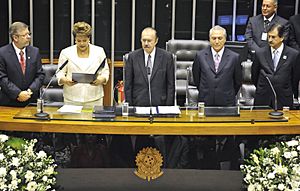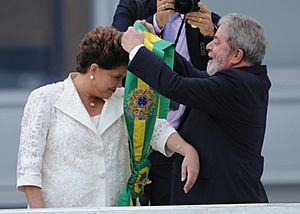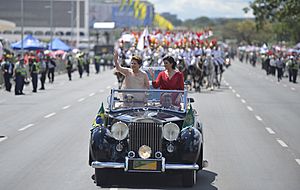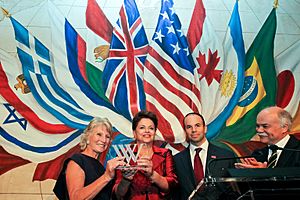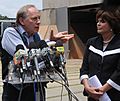Dilma Rousseff facts for kids
Dilma Vana Rousseff (born 14 December 1947) is a Brazilian economist and politician. She is currently the leader of the New Development Bank since March 2023. Before this, she was the 36th president of Brazil from 2011 until August 2016.
Dilma Rousseff was the first woman to become president of Brazil. She also worked as the chief of staff for former President Luiz Inácio Lula da Silva from 2005 to 2010.
Quick facts for kids
Dilma Rousseff
|
|||||||||||||||||||||||||||||||||
|---|---|---|---|---|---|---|---|---|---|---|---|---|---|---|---|---|---|---|---|---|---|---|---|---|---|---|---|---|---|---|---|---|---|
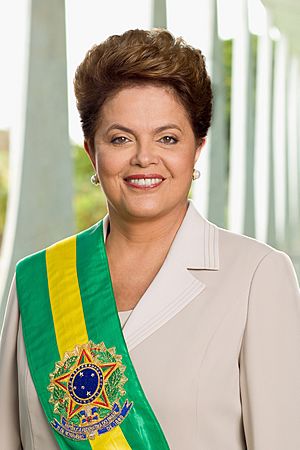
Official portrait, 2011
|
|||||||||||||||||||||||||||||||||
| 36th President of Brazil | |||||||||||||||||||||||||||||||||
| In office 1 January 2011 – 31 August 2016 |
|||||||||||||||||||||||||||||||||
| Vice President | Michel Temer | ||||||||||||||||||||||||||||||||
| Preceded by | Luiz Inácio Lula da Silva | ||||||||||||||||||||||||||||||||
| Succeeded by | Michel Temer | ||||||||||||||||||||||||||||||||
| 3rd Chair of the New Development Bank | |||||||||||||||||||||||||||||||||
| Assumed office 24 March 2023 |
|||||||||||||||||||||||||||||||||
| Preceded by | Marcos Prado Troyjo | ||||||||||||||||||||||||||||||||
| Chief of Staff of the Presidency | |||||||||||||||||||||||||||||||||
| In office 21 June 2005 – 31 March 2010 |
|||||||||||||||||||||||||||||||||
| President | Luiz Inácio Lula da Silva | ||||||||||||||||||||||||||||||||
| Preceded by | José Dirceu | ||||||||||||||||||||||||||||||||
| Succeeded by | Erenice Guerra | ||||||||||||||||||||||||||||||||
| Minister of Mines and Energy | |||||||||||||||||||||||||||||||||
| In office 1 January 2003 – 21 June 2005 |
|||||||||||||||||||||||||||||||||
| President | Luiz Inácio Lula da Silva | ||||||||||||||||||||||||||||||||
| Preceded by | Francisco Luiz Sibut Gomide | ||||||||||||||||||||||||||||||||
| Succeeded by | Silas Rondeau | ||||||||||||||||||||||||||||||||
|
|||||||||||||||||||||||||||||||||
| Personal details | |||||||||||||||||||||||||||||||||
| Born | 14 December 1947 Belo Horizonte, Minas Gerais, Brazil |
||||||||||||||||||||||||||||||||
| Political party | PT (2001–present) | ||||||||||||||||||||||||||||||||
| Other political affiliations |
PDT (1979–2001) | ||||||||||||||||||||||||||||||||
| Spouses |
Cláudio Galeno Linhares
(m. 1967; separated 1969)Carlos Paixão de Araújo
(m. 1969; div. 2000) |
||||||||||||||||||||||||||||||||
| Children | Paula Rousseff | ||||||||||||||||||||||||||||||||
| Alma mater | Federal University of Rio Grande do Sul (BEc) | ||||||||||||||||||||||||||||||||
| Signature |  |
||||||||||||||||||||||||||||||||
Contents
Early Life and Education
Dilma Vana Rousseff was born in Belo Horizonte, Brazil, on 14 December 1947. Her father, Pedro Rousseff, was a lawyer and businessman from Bulgaria. Her mother, Dilma Jane da Silva, was a schoolteacher.
The family lived in a big house and had a good life. Dilma and her siblings, Igor and Zana Lúcia, had a classical education. They learned piano and French.
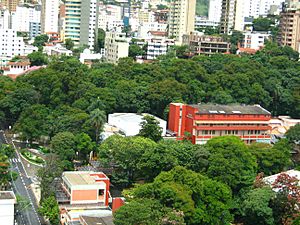
Dilma went to preschool at Colégio Izabela Hendrix. She then attended Colégio Nossa Senhora de Sion, a girls' boarding school run by nuns. Her father passed away in 1962.
In 1964, Dilma left Colégio Sion. She joined Central State High School, a public school for both boys and girls. Students at this school often protested against the military government that had taken power in Brazil.
Political Career
As a young adult, Dilma Rousseff became involved in groups that opposed the military government in Brazil. She was arrested and spent time in jail from 1970 to 1972.
After her release, Rousseff moved to Porto Alegre and started a new life. She helped create the Democratic Labour Party (PDT) in her state. She worked in local government, first as treasury secretary of Porto Alegre. Later, she became Secretary of Energy for the state of Rio Grande do Sul.
In 2001, she left the PDT and joined the Workers' Party (PT).
In 2002, she advised Luiz Inácio Lula da Silva on energy policy when he ran for president. After he won, he asked her to become his Minister of Energy. In 2005, she became his chief of staff, a very important role. She held this job until 2010, when she decided to run for president herself.
On 31 October 2010, Dilma Rousseff was elected president of Brazil. She was the first woman to hold this position.
On 26 October 2014, she won a second term as president. She won by a small number of votes.
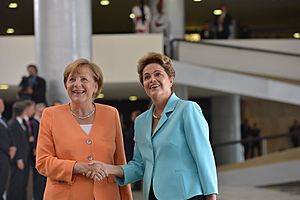
Public Support
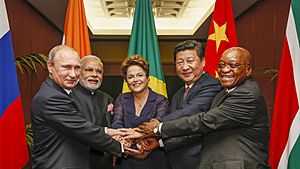
During her first term, many Brazilians approved of Dilma Rousseff's leadership. In early 2013, about 63% of Brazilians approved of her government. Her personal approval rating was even higher, at 79%.
Her popularity was due to some of her government's actions. These included lowering taxes on energy bills. She also removed federal taxes on basic food items like meat, milk, and rice. These changes made daily life more affordable for many families.
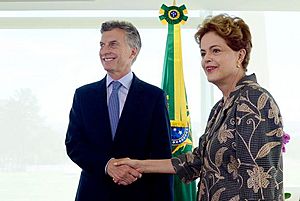
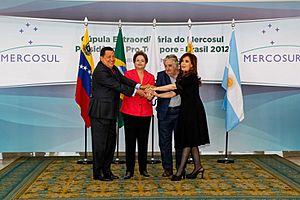
However, in early 2015, her popularity began to drop. By July 2015, her approval rating was very low, and many people disapproved of her. Later that year, many Brazilians protested and asked for her to be removed from office.
International Recognition
Dilma Rousseff was recognized as one of the most powerful women in the world by Forbes magazine. She was ranked fourth in 2014 and second in 2013.
In 2011, she was third on Forbes' list of most powerful women. She was also on the list of the most powerful people in the world, ranking 16th overall.
On 20 September 2011, she received the Woodrow Wilson Public Service Award in New York City. The next day, she became the first woman to open a meeting of the United Nations General Assembly. She was also featured on the cover of Newsweek magazine.
| Award or decoration | Country | Date | |
|---|---|---|---|
| Grand Cross of the Order of the Balkan Mountains | 5 October 2011 | ||
| Collar of the Order of Isabella the Catholic | 19 November 2012 | ||
| Grand Cross of the Order of the Sun of Peru | 4 November 2013 | ||
| Collar of the Order of the Aztec Eagle | 26 May 2015 | ||
| Grand Collar of the Order of Boyacá | 9 October 2015 | ||
| Order of Friendship | 13 September 2024 | ||
End of Presidency
On 2 December 2015, a request to remove Dilma Rousseff from office was accepted by the head of the Brazilian House of Representatives. A special group looked into the accusations. They suggested that the full House should allow the charges to be sent to the Senate.
On 17 April 2016, the House of Representatives voted to send the request to the Senate. On 12 May 2016, the Senate began a trial. Dilma Rousseff was told about it, and she was temporarily suspended from her job as president.
Vice President Michel Temer took over her duties as acting president during this time.
On 31 August 2016, the Senate voted to find her guilty of breaking budget laws. She was then officially removed from office. Michel Temer became the new president of Brazil.
After the Presidency
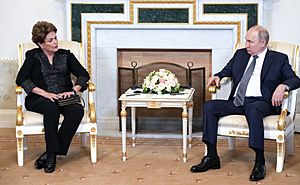
In 2018, Dilma Rousseff ran for a seat in the Federal Senate for her home state. However, she did not win the election.
She was interviewed for a documentary film in 2019 called The Edge of Democracy.
On 24 March 2023, Dilma Rousseff was chosen to be the president of the New Development Bank. This bank was created by the BRICS countries (Brazil, Russia, India, China, and South Africa).
Private Life
Dilma Rousseff has a daughter named Paula Rousseff de Araújo, born in 1976.
She enjoys history and is interested in opera. She also likes to read. Some of her favorite authors are Machado de Assis and Guimarães Rosa.
She can understand English well when spoken slowly. She can also speak Spanish and a little French.
Images for kids
-
Dilma Rousseff during an interview in São Paulo.
-
Gateway of Tiradentes Prison in São Paulo city, where Rousseff was held during the military government.
-
Dilma Rousseff after voting in Porto Alegre, in 2010.
-
Rousseff receiving a photograph of Hugo Chávez from Nicolás Maduro at the Planalto Palace, 9 May 2013.
-
Dilma Rousseff in a meeting with evangelical singers and bishops, at the Planalto Palace.
-
Dilma Rousseff and Leonel Brizola.
-
Dilma Rousseff speaks during a meeting in Brasília, March 2009.
-
Dilma Rousseff and Barack Obama at the White House, 2009.
-
Dilma Rousseff in the 2010 Workers' Party National Convention.
-
President Rousseff meets with Bulgarian President Georgi Parvanov in Sofia, October 2011
-
Rousseff with President of the European Council Herman Van Rompuy and President of the European Commission José Manuel Barroso with in EU–Brazil Summit in Brussels on 3 October 2011
-
Thousands of protesters against the government of President Rousseff march en route to the National Congress in Brasilia, 13 March 2016.
See also
 In Spanish: Dilma Rousseff para niños
In Spanish: Dilma Rousseff para niños
- List of presidents of Brazil
 | Roy Wilkins |
 | John Lewis |
 | Linda Carol Brown |



